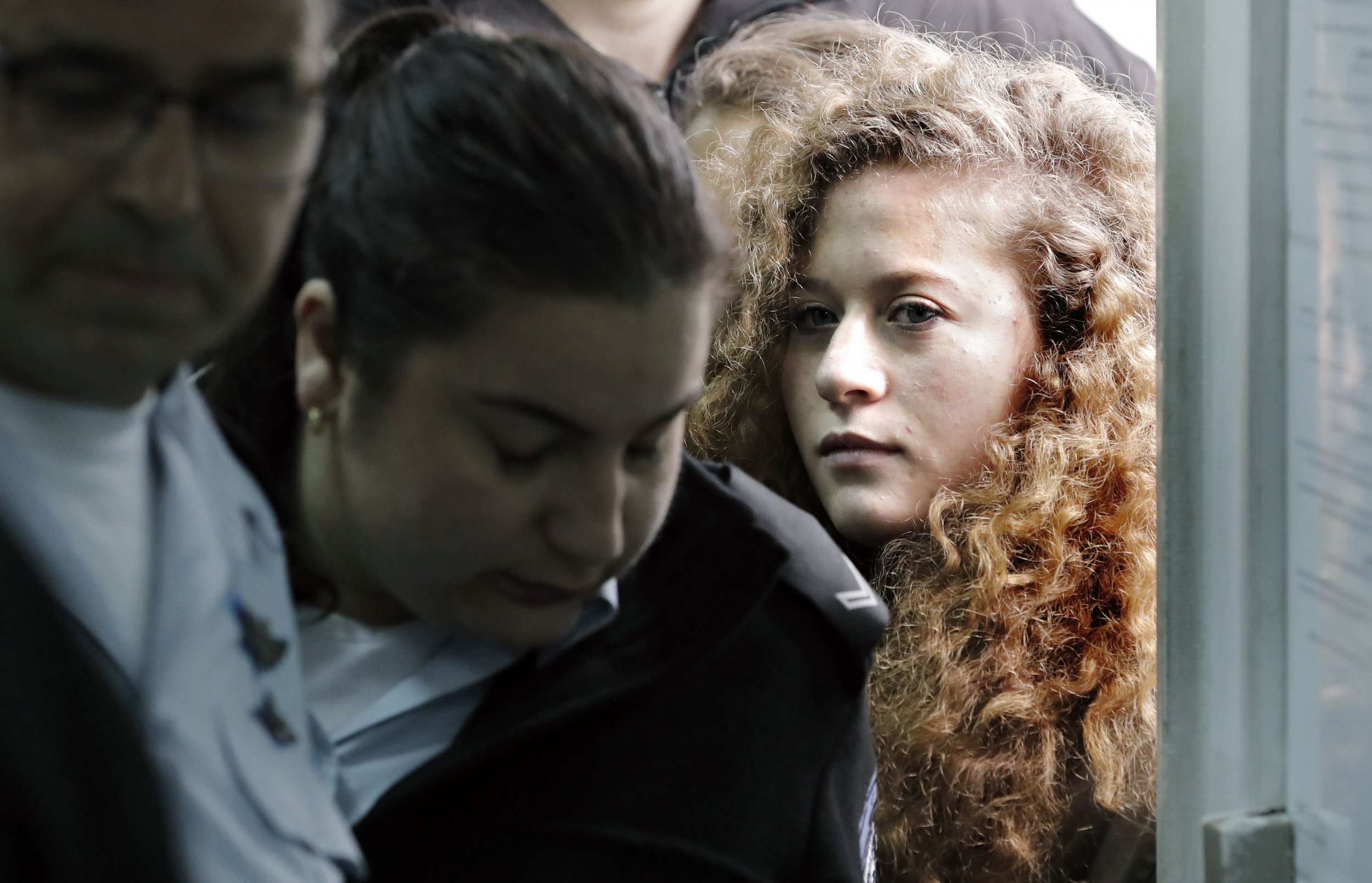
A little over three months ago, the Israeli military arrested Ahed Tamimi, a Palestinian teenager, in the middle of the night. She was 16-years-old at the time of her high-profile arrest and celebrated her 17th birthday in prison. She was quickly charged with a string of offenses, some dating back many months, and remanded in custody pending the end of legal proceedings against her.
Hundreds of Palestinian minors are arrested, charged and held in custody this way every year. Tamimi's case is exceptional only in sparking public interest and wide media coverage in Israel and abroad.
Tamimi's trial began on February 13, 2018. On the first day of her trial, likely in reaction to this interest, the military judge hearing the case, Lt. Col. Menachem Lieberman, ordered that the proceedings be held in camera (in private,) citing Tamimi's best interest, despite the objections from Tamimi and her parents. A month later, on 19 March 2018, President of the Military Court of Appeals Col. Netanel Benisho denied Tamimi's appeal of this decision, citing procedure. He argued that he does not have jurisdiction to overturn the ruling.
That said, Col. Benisho did choose to pen a few words on the matter. He wrote that Lt. Col. Lieberman's decision perfectly reflects the changes made in legislation and through case law "to best realize the interest of safeguarding the minor facing criminal proceedings." Yet the attempt by both justices to hide behind the argument of "Tamimi's best interest" is so unfounded, so at odds with reality, that it must be denounced for the blatant, cynical lie that it is.
Israel's arrest and prosecution of Palestinian minors in the West Bank involves systemic, routine abuse of their rights. They are taken from their homes or from the street without their parents being informed. They are often subjected to violence and threats during interrogations, which take place without parents or lawyers present, and they are automatically remanded in custody pending the end of proceedings.
In such a system, the best interest of Palestinian minors hardly crosses the Israeli judges' minds, let alone guides their decisions. Maybe it is better to tell it like it is, and state the simple truth: The court's decision to close its doors had nothing to do with protecting Tamimi's rights and everything to do with defending the image of the occupation.
The refusal of the military justices to expose what goes on in the Military Juvenile Court denied us the opportunity to witness a rare occurrence in the military courts—an actual trial. The state, its judges and its PR people (official and otherwise), consider the establishment of the Military Juvenile Court a landmark achievement that supposedly indicates the great importance the state attributes to safeguarding the rights of Palestinian minors tried in this court.
Yet, like all military courts in the West Bank, the work of the juvenile court judges boils down to signing off on plea bargains reached between the defense and the prosecution outside the courtroom, which the minors have no choice but to accept. Trials, in which the prosecution must present evidence and the defendant has a chance to refute it, are rare. Tamimi's case is an anomaly simply because this time, the Military Juvenile Court looks poised to engage in performing the singular spectacle of a "trial."
Lieberman's decision to hold the proceedings in camera, keeping the trial concealed from the scrutiny of the public eye was not made in a vacuum. It must be considered in the context in which the military court system—an integral part of Israel's regime of occupation in the West Bank—operates. It is not a neutral institution seeking to apply the principles of justice and human rights. Rather, it is a system dedicated to maintaining the occupation: a regime in which the judges and prosecutors are always Israeli soldiers, and the suspects and defendants Palestinians.
Small wonder that changes to the military court system made over the last decade, supposedly to safeguard minors' rights (such as establishing the Military Juvenile Court, reducing detention times and raising the age of majority), altered nothing. They were meant solely to improve the image of the military courts and lend them the semblance of a functioning, fair and reliable system.
Yet looks cannot deceive for long, and the new layers of paint do nothing to alter the ugliness they try to gloss over. The military system that tries Palestinian youths still bears no resemblance to juvenile justice systems in Israel or abroad. It is the best interests of the occupation, not the child, that the judges put first. They view the incarceration of Palestinian minors as standard procedure rather than an exceptional, extreme measure, and they certainly make no mention of rehabilitation options as an alternative to criminal proceedings.
The façade created by various modifications do not make this policy just, moral or legal under international law. Law and procedure can serve justice just as much as they can serve injustice. The choice is in the hands of those who draft and apply them. Yet these appearances do help Israel silence opposition to the occupation, enabling the state to arrest and imprison hundreds of Palestinian minors a year, abusing their rights in the process, and to retain control over millions of Palestinians.
This truth must constantly be brought to the fore—not in the naive hope of improving a system that is rotten to the core, but in the understanding that the only way to end this grotesque show of "Israeli justice" is to end the occupation.
Attorney Yael Stein is the head of research at Israeli NGO B'Tselem, which monitors Israeli military activity in the West Bank.
Uncommon Knowledge
Newsweek is committed to challenging conventional wisdom and finding connections in the search for common ground.
Newsweek is committed to challenging conventional wisdom and finding connections in the search for common ground.
About the writer
To read how Newsweek uses AI as a newsroom tool, Click here.








